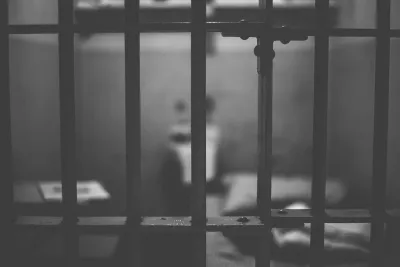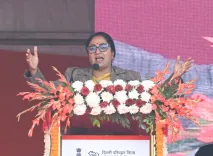Why Are Hundreds of Children Living Behind Bars with Their Incarcerated Mothers in Pakistan?

Synopsis
Key Takeaways
- Over 140 children under six live in prisons with their mothers in Punjab.
- Prison conditions are poor, lacking proper sanitation and healthcare.
- These children face a traumatic upbringing due to their environment.
- Legal provisions fail to protect their childhood and emotional well-being.
- Urgent reforms are needed to address this moral crisis.
Islamabad, Oct 27 (NationPress) The brutality of Pakistan's justice system is starkly evident as hundreds of children are confined behind bars, not due to any wrongdoing, but because their mothers lack alternative shelter. A recent report highlights that at least 140 children under the age of six are growing up in prisons alongside their incarcerated mothers in the Punjab province alone.
In the stark reality of Pakistan’s prisons, innocence is trapped in the most unnatural of environments: steel cages, overcrowded cells, and stagnant air. Childhood here unfolds in confinement. Specifically in Punjab, at least 140 children, including 67 boys and 73 girls across 45 prisons, are spending their formative years in prison. These children’s earliest memories are not of playgrounds or books, but of barred gates and the clanging of heavy doors,” the report from Islam Khabar elaborates.
The most impacted facilities mentioned in the report are Adiala Jail and Multan Women’s Jail, which house the highest number of children. These young ones are not considered inmates by law, yet they inherit a life of confinement due to their mothers serving time. The emotional toll of such an upbringing is unquantifiable. Growing up in such conditions leads to a distorted understanding of safety, freedom, and authority.
The report indicates that the lives of these children are a tragic consequence of a justice system that prioritizes procedural adherence over moral obligation. Authorities maintain that the law allows infants to stay with their mothers until they are five — a provision meant to strengthen maternal bonds. However, buried within this bureaucratic language lies a harsh reality: legality does not equate to humanity. The law permits their presence but fails to safeguard their childhood. Upon reaching the age limit, these children are often removed and placed with relatives or in SOS Villages, resulting in a second displacement that exacerbates their trauma,” the report states.
According to the findings, most prisons in Punjab offer only basic amenities such as thin mattresses, limited food, and minimal healthcare. Meals generally consist of lentils and flatbread, which do not meet the nutritional needs of growing children. Access to milk or fruit is rare, while educational opportunities, if available, are inconsistent. Some prisons claim to provide basic schooling, yet teachers are infrequent, and lessons occur in cramped, unsuitable environments.
“Prisons are not designed to accommodate infants or toddlers. Sanitation is poor, ventilation is lacking, and disease spreads easily. The absence of pediatric healthcare leaves these children vulnerable to preventable illnesses, while the lack of emotional stimulation hampers their cognitive and social development. They are being shaped by an environment intended for punishment, not protection.
Officials insist on adhering to “legal obligations,” revealing a bureaucracy more focused on compliance than addressing the moral crisis within its walls.
A prison cell can never be a cradle. Yet in Pakistan, it has become the only home for dozens of innocent lives. These children are growing up in the shadows of punishment they never deserved, their joy suppressed by walls intended to confine. They embody the most voiceless victims of a justice system steeped in indifference — a system that measures compliance by the letter of the law rather than the depth of its moral compass. To be born behind bars is to start life in captivity. For over a hundred children across Pakistan, this captivity is all too real — a world marked by confinement, deprivation, and the gradual loss of childhood innocence. As long as this persists, each day behind those walls is another day robbed from the innocence of Pakistan’s forgotten generation,” the report concludes.










